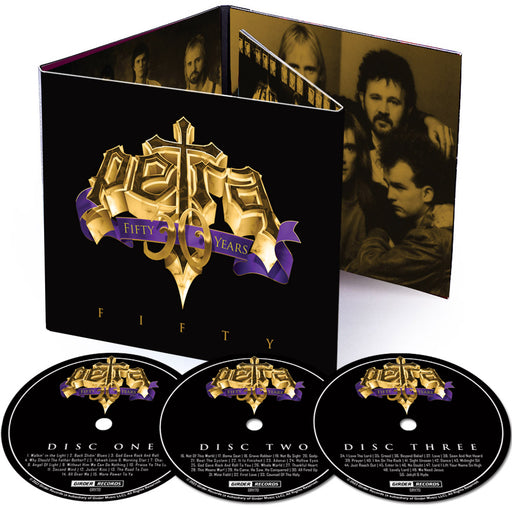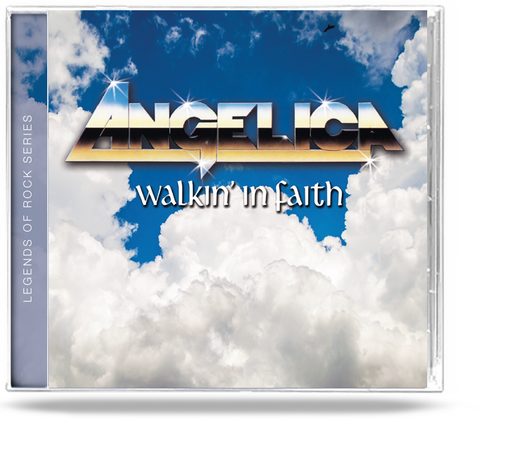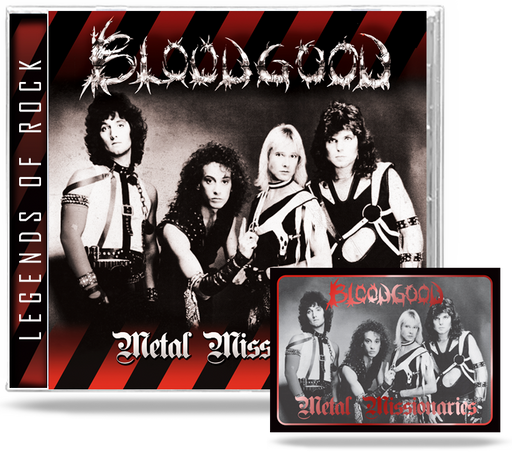Les Carlsen - 1971 with STICKER (2019 Girder Records) Bloodgood Vocalist
ONLY 3 CDS WITH LIMITED EDITION 1971 STICKER
For fans of Black Sabbath, Alice Cooper, Iggy Pop, Thin Lizzy and Deep Purple. This album was recorded in 1971.
- Vocalist Les Carlsen of BLOODGOOD's first album
- Early 1971 music from Les' first band while in HAIR
- 4 panel Digipak CD
- 2019 GIRDER RECORDS GR1006
- Limited to 300 copies
Bloodgood's Lead Singer, Les Carlsen. This amazing CD comes from a remastered cassette that Les recorded in 1971 while touring as the lead role "Claude", with the Broadway musical HAIR. Les put together material for an album with a group of musicians from Seattle, but it's never been released until now. It was the first album ever recorded by Les, a lost treasure found on cassette and remastered by David Zaffiro.
Record Label: GIRDER RECORDS
Artist: Les Carlsen
Album: 1971
Release Date: Jan 11, 2019
Style: Classic Hard Rock
UPC: 080101033671
Limited to: 300 Copies
DESCRIPTION
While touring as the lead role Claude, with the Broadway musical HAIR, Les put together material for an album with a group of musicians from Seattle. It was recorded in 1971, but never released until now. It was the first album ever recorded by Les, a lost treasure found on cassette and remastered by David Zaffiro.
The song BAD CREDIT was re-worked and re-titled as IT’S ALRIGHT and recorded along with the song CHANGING ME by BLOODGOOD on OUT OF THE DARKNESS. Flesh Failures and Let the Sunshine In were original HAIR songs.
Les originally wrote the song CHANGING ME for a clothing store in Miami, back in 1971, in exchange for clothes from their store including those Stars and Stripe pants that he's wearing on the back cover and disc face.
HAIR influenced Les's theatrical approach to all his music. Les’s vocals sound very young but the Les Carlsen 'sound' is unmistakable. The primal scream in SOMEDAY is a foreshadowing of the signature screams in later BLOODGOOD material.
Originally posted on YouTube by ibamct1 (Used with Permission)
TRACKS
- Valley of the Shadow (Mike Elliott)
- Elevator Operator (Ted Shreffler)
- Hello There (John Agostino)
- Can You Hear Me (Mike Elliott)
- Flesh Failures - Let the Sunshine In (Galt McDermott, James Rado, Gerome Ragni)
- Lay Me Down (Les Carlsen, John Agostino)
- Bad Credit (Les Carlsen)
- Someday (Bob Coie)
- Changing Me (Les Carlsen)
- Battle Fatigue (Les Carlsen, John Agostino)
Members
Les Carlsen - Vocals
John Agostino - Drums
Mike Elliott - Guitar, Moog
Ted Shreffler - Keyboard, Mellotron
Bob Coie - Bass
ANGELIC WARLOARD REVIEW
There’s underrated, under-appreciated and overlooked. And then there is plain old forgotten. As in Les Carlsen’s debut solo album, which could not have fallen between the cracks more in light of how he recorded it in 1971, hence its title, while touring as the lead role ‘Claude’ with the Broadway musical Hair. The iconic front man, with six studio albums and three live albums to his credit as part of Christian metal legends Bloodgood, put the album together with a group of musicians from Seattle but it never saw release until now. A lost treasure recently rediscovered by the artist on cassette, 1971 saw official release on Girder Music in January of 2019 as a full-length 11-song album (in the digi pak format) after being re-mastered by former Bloodgood guitarist David Zaffiro.
So what does 1971 sound like after the passing of nearly 50 years? If I suggest it sounds raw then I do so as a neutral observation and not critique when factoring how Zaffiro worked obvious wonders on what amounts a recording using early 70’s technology. Thin but vintage and listenable might be the best way to summarize production.
If I suggest the album sounds dated musically, I also do so neutrally when factoring the period in which it was recorded. Actually, any dated aspect to the recording is a plus when pinpointing its musical influences, encompassing but not limited to Black Sabbath, Led Zeppelin, The Beatles, The Who, The Rolling Stones, Alice Cooper, The Doors and many others from the period. No, 1971 might not be as good, albeit those mentioned provide a good point of reference in terms of musical direction in which it takes. When taking a closer look at the list, one potentially concludes the music scene back in the day might have had a bit more substance compared to current climes.
For those wondering, 1971 might not rock heavy as Bloodgood but certainly rocks hard in places in also drawing upon the blues, funk and groove, art rock, classic rock and even progressive rock- a classic 70’s sound in the truest sense! In other words, rather than some current band attempting to evoke the seventies, 1971 is the real deal from a legitimate 70’s band mirroring the musical trends of the time. It is almost the equivalent of opening a musical time capsule in this regard.
So how does Carlsen sound roughly 50 years previous? Close listen to opening cut “Valley Of The Shadows” reveals him sounding quite good, keeping in mind he is yet to fully develop the signature raspy to high end classic tenor style he ultimately perfected with Bloodgood. The point being he exhibits the abilities that would later allow him to become one of the more easily identifiable front men of his era.
Musically, “Valley Of The Shadows” is one of the albums finer, with the Sabbath-like riffs to cover its opening carrying over to its verse sections prior to an abrupt changeover to an angelic chorus to feature choir like vocal harmonies. Do I detect a faint precursor to opening Bloodgood cut “Accept The Lamb”? Speaking of time changes, song could not make more of a left turn over its final minute and a half as it takes a funk based direction as Gospel choirs repeat how the ‘walls of Jericho came tumbling down’.
“Elevator Operator” ensues as an upbeat classic rocker with a heavier edge. Shorter at just two and a half minutes, it features guitar tones to hint of The Who along with a jamming bass line to carry the low end in rabid fashion. Instrumentally, things change towards a darker direction to embody and eerie keyboard solo. You cannot say Carlsen did not surround himself with a group of talented musicians back in the day.
Albums first ballad “Hello There” floats its distance to acoustic guitar and orchestration as the artist bestows the smoother side to his vocal abilities. The haunting medieval flair to realize hints somewhat of ArkAngel, a particular I suggest in the most flattering sense.
A mid-tempo groove direction realizes on “Can You Hear Me”. With another pronounced bass line leading the way, the song encapsulates grooving guitars with a strong does of melody while not backing from the instrumental focus, as found in the extended Hendrix style lead guitar! A spacey keyboard solo closes things out.
Two-part cut “Flesh Failures - Let The Sunshine In”, both original Hair songs, highlight some of the albums heavier moments, as hard rock riffing leads the way (to drift between the left and right channels) alongside screaming feedback and a rollicking beat. Subsequent to two minutes, however, morphs into a ballad as keyboards take over in presenting with an almost child-like rhythm. Quite the contrast but it works.
“Lay Me Down” starts masterfully as another piano ballad in unveiling a superlative melody of a radio friendly kind (when factoring the period at hand) but for reasons unknown cuts off at just a minute and leaves the listener wanting more. If they had carried it out by another couple of minutes, I would rank with the albums better.
“Bad Credit” was later re-worked and re-rerecorded by Bloodgood under the title “It’s Alright” (off Out Of The Darkness from 1989) and a second time by the artist for his classic rock project Carlsen Cromwell (The Lucky Side from 2015) under the initial “Bad Credit” title. In its original form it reflects the recognizable “It’s Alright” melody as an upbeat rocker to accent lightly done guitars and a full keyboard mix. Impetus further picks up for a groove to funk based instrumental section to convert into an acoustic guitar solo.
“Changing Me”, another come to mind at once Bloodgood track (also Out Of The Darkness), ensues but as up-tempo borderline hard rock as opposed to the epic six minute ballad we are most familiar. Outside of similar melody, the two versions are disparate to the point we are almost talking about completely different songs, but give either party credit in that I appreciate the distinctive nuances to both renderings.
“Someday” sets apart as a gradually moving plodder. The distorted bass solo to start gives way to a measured impetus, with the song slow and dreamy advancing ahead in exuding another funk to groove laden feel as guitar hint of the bluesy. Impetus only picks up for the duel instrumental interludes carried by accelerated lead guitar.
Eight and a half minute magnum opus closing cut “Battle Fatigue” is certain to delight progressive aficionados with its joining of moody emotion and pointedly victorious to make a grandiose statement. Verses embody the former, coming across brooding in drifting to tenuous keyboards, and refrain the latter, breaking out in triumphant ‘come all ye faithful, joyful triumphant’ fashion in shored up by Gospel choirs. Exciting instrumental sections abound, including the first carried by distorted feedback drifting between the left and right channels and second home to guitar harmonies that transition to the melody of “Jesus Christ Superstar”. If Angelic Warlord were around in 1971, I would vote this song of the year.
In light of how I was expecting 1971 to be a next to unlistenable early 70’s demo recording, I could not be more pleasantly surprised. Rather, it proves a musically a solid front to back release in highlighting some very strong material, noting anthems “Valley Of The Shadows” and “Battle Fatigue”, and what would go on to become classic Bloodgood tracks, referencing “Bad Credit” and “Changing Me”. Musicianship is also of high quality, and while yet to completely come into his own, Carlsen sounds fine in exhibiting the potential he would later fulfill with Bloodgood. Of course, some reasonably understandable production issues exist when factoring the period in which 1971 was recorded. Overall, I am glad Girder Music pulled itout of the vault for a more than welcome re-issue. If not too busy trying on bell-bottom pants, picking out shag carpet or organizing your 8-track collection, then 1971 comes recommended for fans of Bloodgood or 70’s rock in all its forms!
Review by Andrew Rockwell







